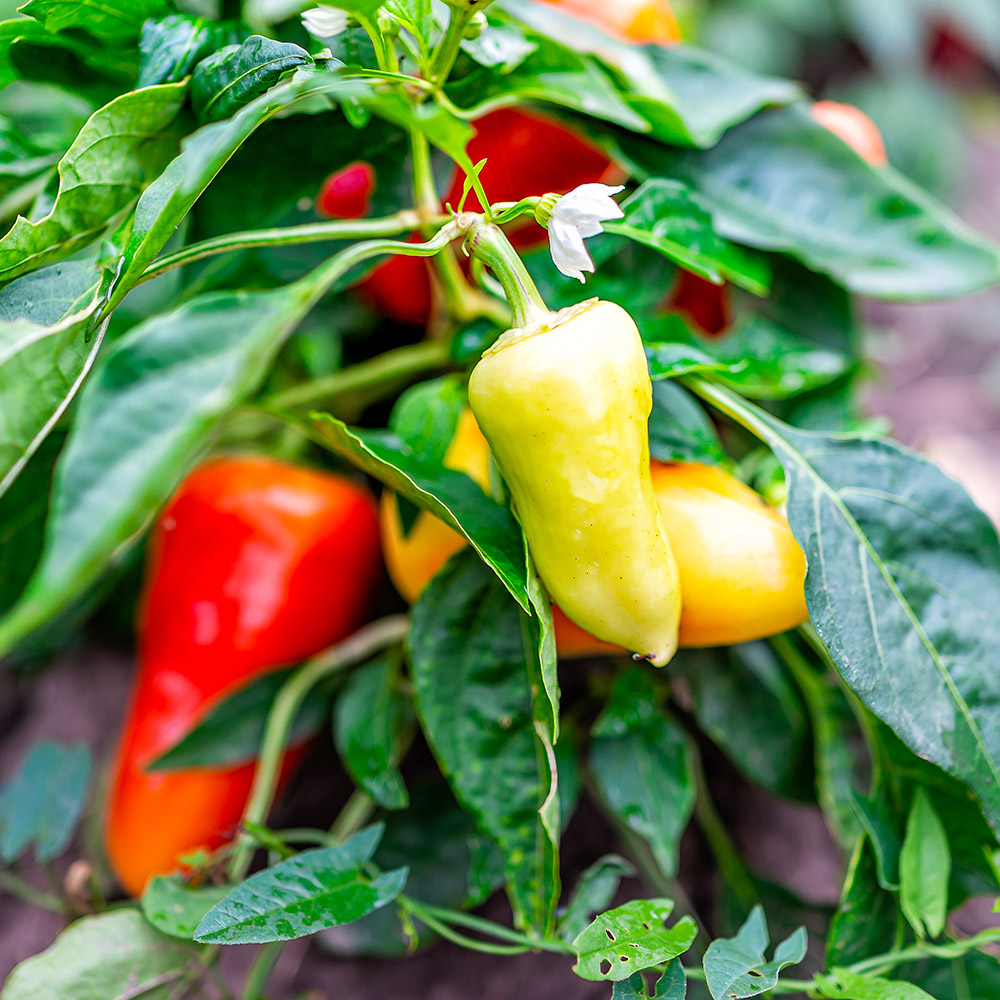Best Fertilizers for Peppers: Make Best Use Of Plant Health and Yield
Best Fertilizers for Peppers: Make Best Use Of Plant Health and Yield
Blog Article
Organic Vs. Synthetic Fertilizers: Which Is Best for Nurturing Healthy Pepper Plants?
In the realm of supporting healthy and balanced pepper plants, the selection in between natural and artificial fertilizers stands as a critical decision with far-reaching effects. While both choices purpose to give vital nutrients to support plant development, the nuances of their effect on the dirt, plant health and wellness, and the setting trigger an argument that echoes throughout the horticulture neighborhood. Comprehending the distinct benefits and potential pitfalls of each plant food type is crucial for pepper farmers seeking to maximize their yields while keeping an eco-conscious and lasting technique.
Benefits of Organic Plant Foods
Organic fertilizers use an environmentally-friendly and lasting method to beneficial pepper plants, offering essential nutrients without using synthetic chemicals. These all-natural fertilizers are originated from organic resources such as compost, manure, bone dish, and seaweed, advertising soil health and biodiversity. Unlike artificial fertilizers, natural choices release nutrients gradually, making sure a stable and well balanced supply for pepper plants to flourish.
One significant benefit of organic plant foods is their capacity to enhance soil framework and water retention. By improving dirt wellness, natural plant foods promote helpful microbial task, which assists in nutrient uptake by pepper plants. In addition, natural plant foods decrease the risk of chemical run-off, securing water resources from air pollution and guarding the setting.
Moreover, natural plant foods add to long-lasting soil fertility by promoting the development of useful soil microorganisms. These microorganisms help damage down raw material, releasing nutrients in a kind that is easily accessible to pepper plants. best fertilizers for peppers. By fostering a healthy and balanced soil environment, natural fertilizers sustain sustainable pepper farming techniques that benefit both plants and the setting
Disadvantages of Artificial Fertilizers
Artificial fertilizers, in contrast to their natural counterparts, posture numerous disadvantages when utilized to nurture pepper plants, influencing both plant wellness and environmental sustainability. One major drawback of artificial fertilizers is their propensity to seep nutrients from the dirt quickly. This fast leaching can lead to nutrient discrepancies in the dirt, causing plants to struggle with deficiencies or toxicities. In addition, artificial plant foods can hurt helpful dirt organisms, such as earthworms and useful germs, disrupting the soil ecosystem's balance.
Moreover, the overuse of synthetic fertilizers can add to water contamination. Excess fertilizers not absorbed by plants can remove right into water bodies, bring about eutrophication, where algae blossoms diminish oxygen degrees in the water, harming marine life. Artificial fertilizers are commonly obtained from non-renewable sources, such as fossil fuels, adding to carbon emissions and environmental destruction throughout their production.
Nutrient Absorption Comparison
Reliable nutrient absorption plays a vital role in the general health and development of pepper plants. When contrasting synthetic and natural fertilizers in regards to nutrient absorption, natural fertilizers have the benefit of giving a more well balanced and slow-release resource of nutrients (best fertilizers for peppers). Organic fertilizers consist of a variety of macro and micronutrients that are not just helpful for the plants but likewise promote healthy soil microbial task, which assists in nutrient uptake. On the various other hand, synthetic plant foods often supply a fast release of nutrients, which can result in seeping and runoff, leading to reduced nutrient absorption More Info prices by the plants.
In addition, organic fertilizers enhance soil structure and water retention capability, permitting pepper plants to gain access to nutrients extra successfully. This enhanced dirt quality assists in origin development, making it possible her explanation for better nutrient absorption. Artificial plant foods, although initially boosting plant growth due to their high nutrient concentrations, might prevent lasting nutrient absorption by derogatory dirt health and wellness gradually.
Environmental Impact Considerations

On the various other hand, synthetic plant foods, although frequently even more promptly offered and focused to plants, can have damaging effects on the atmosphere if not used properly (best fertilizers for peppers). Their manufacturing requires high power inputs, resulting in greenhouse gas exhausts and contributing to environment change. In addition, the runoff of excess artificial fertilizers can infect water sources, causing eutrophication and harming marine communities.
Best Plant Food Practices for Peppers
When fertilizing pepper plants, enhancing nutrient uptake and decreasing ecological influence are essential factors to consider. To achieve this, it is vital to comply with finest plant food practices customized to the details needs of pepper plants. One critical practice is to carry out a dirt test before using any plant foods. This test can figure out the pH level of the dirt and identify any kind of nutrient deficiencies, assisting you in picking the most ideal fertilizer formula.
Another crucial technique is to feed pepper plants at the correct time. Usually, peppers profit from getting plant food at growing and afterwards once more when they begin to blossom. Over-fertilizing can lead to nutrient discrepancies and hurt the plants, so it is important to comply with suggested application prices.
In addition, choosing a well balanced fertilizer with an NPK proportion that fits pepper plants' requirements is essential. Ultimately, integrating synthetic and natural fertilizers deliberately can assist support healthy pepper plants while decreasing environmental influence.
Conclusion

Organic fertilizers supply an environmentally-friendly and sustainable strategy to nourishing pepper plants, supplying vital nutrients without the usage of synthetic chemicals. Unlike synthetic fertilizers, organic alternatives launch nutrients slowly, making certain a stable and well balanced supply for pepper plants to flourish.
Synthetic plant foods, in comparison to their natural equivalents, pose various downsides when made use of to nurture pepper plants, impacting both plant health and environmental sustainability. When comparing artificial and natural plant foods in terms of nutrient absorption, natural plant foods have the benefit of giving a more balanced and slow-release source of nutrients.In addition, natural fertilizers boost dirt structure and water retention capability, permitting pepper plants to accessibility nutrients more efficiently.
Report this page